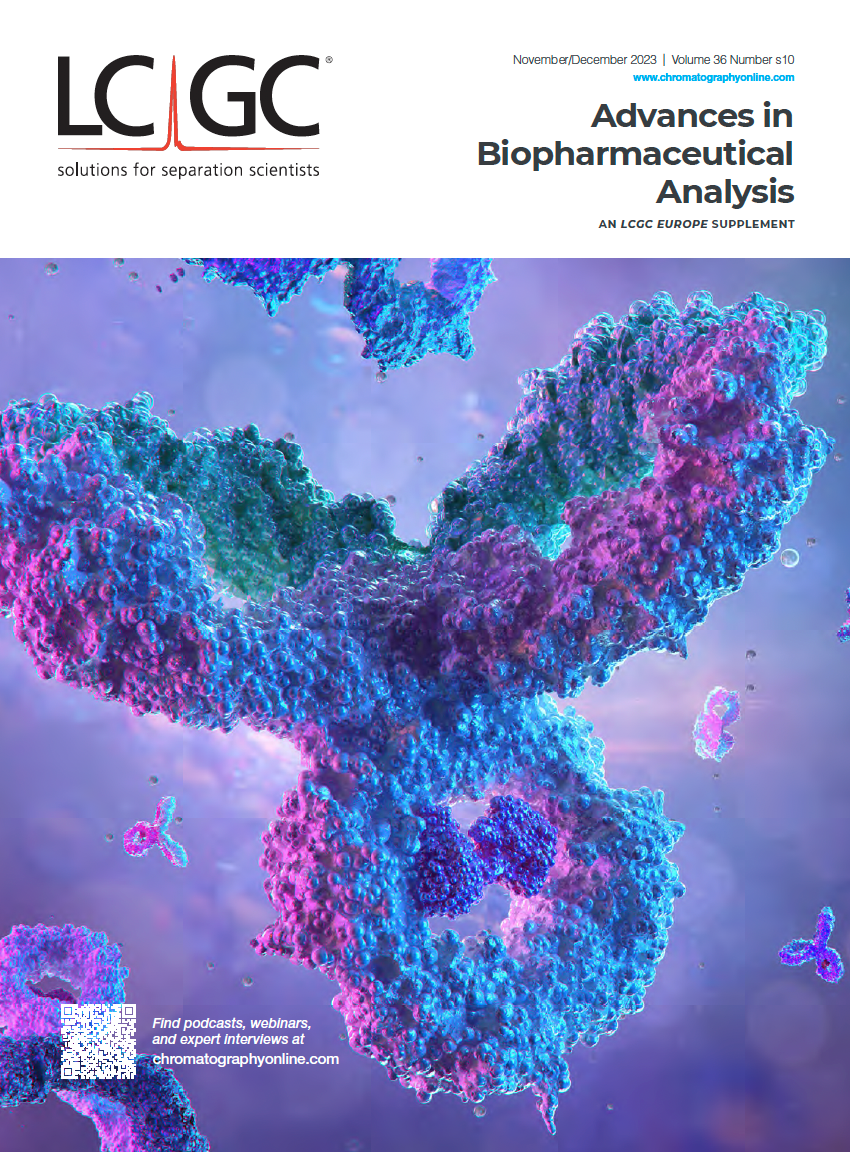Pushing Boundries
With the advent of novel and intricate biotherapeutic formats advancing through biotech company pipelines, the significance of analytical characterization has grown exponentially. This special issue offers a comprehensive overview of contemporary analytical trends and recent advances in biopharmaceutical analysis, aiming to provide valuable insights into the analytical workflows and characterization strategies associated with biopharmaceutical products and new modalities.
Kevin Jooß and Govert W. Somsen review analytical methods enabling the separation and identification of therapeutic proteins under native conditions, crucial for studying their higher-order structures and structure-function relationships. The review highlights the emergence of hyphenated techniques, specifically native mass spectrometry (nMS) combined with native-mode separation, as valuable tools for targeted assessment of quality attributes in biopharmaceuticals. The described methods offer insights into aspects such as aggregation, charge variants, conjugate stoichiometry, affinity, and conformation. The authors anticipate that with the further advancements in multidimensional chromatography and ion-mobility spectrometry, native hyphenated techniques will become more accessible in laboratories.
Arnaud Delobel and colleagues introduce a new chromatographic separation strategy for the analysis of therapeutic mRNA by LC–MS. The described methodologies offer a versatile and efficient characterization of mRNA quality attributes, applicable to various mRNA types without specific conditions, and integrating drug substance and product analysis. The strategy includes on-bead digestions before LC–MS characterization, enabling a comprehensive analysis of poly(A) tail, capping, residual nucleotides, and lipid characterization in lipid nanoparticles with a single sample preparation. This multi-attribute approach, requiring minimal resources, enhances time-to-result and offers flexibility for future advancs in mRNA-based therapeutic system analysis.
Anurag S. Rathore and Srishti Joshi discuss biosimilars, which are drug products closely resembling off-patent reference products in terms of purity, molecular structure, and bioactivity. The approval of biosimilars relies on demonstrating no clinically meaningful differences through analytical and functional assessments of critical quality attributes. The article specifically reviews recent biosimilarity assessments for granulocyte-colony-stimulating factor (G-CSF), insulin glargine, rituximab, and trastuzumab.
Finally, this special issue also includes an interview with Reed J. Harris, who recently retired after working for over 38 years at Genentech. In this Q&A article, Reed emphasizes the importance of chromatographic methods in detecting structural variants of monoclonal antibodies (mAbs) and identifying critical quality attributes. The interview discusses challenges in linking mAb structural changes to drug bioactivity, the significance of distinguishing different mAb size variants, and overcoming challenges in analyzing mAb charge variants. The use of multiple analytical techniques, such as isoelectric focusing and multiple attribute monitoring (MAM), is highlighted. The interview also touches on the transformative impact of mAb development on analytical scientists, career experiences, and the evolving landscape of biotechnology, including new modalities like gene therapy products.
This special issue focuses on diverse methodologies to address challenges in the analytical characterization of biotherapeutics within a dynamic and complex landscape. All contributions showcase the necessity for analytical workflows and characterization strategies to adapt to the evolving landscape of next-generation biotherapeutic formats. We hope that these latest insights may inspire scientists to not hold back and keep pushing the boundaries of separation science and mass spectrometry.
Valentina D'Atri, PhD is a Research and Teaching Fellow in the School of Pharmaceutical Sciences at the University of Geneva, in Geneva, Switzerland.

Jelle De Vos, PhD, is a Senior Scientist with the RIC Group, in Kortrijk, Belgium.


LC–MS/MS-Based System Used to Profile Ceramide Reactions to Diseases
April 26th 2024Scientists from the University of Córdoba in Córdoba, Spain recently used liquid chromatography–tandem mass spectrometry (LC–MS/MS) to comprehensively profile human ceramides to determine their reactions to diseases.
The 26th Norwegian Symposium on Chromatography
March 29th 2024The 26th Norwegian Symposium on Chromatography was held 21–23 January 2024. The symposium has strong traditions in the Norwegian separation science community, serving as a forum for excellent scientific talks, networking, and social events.